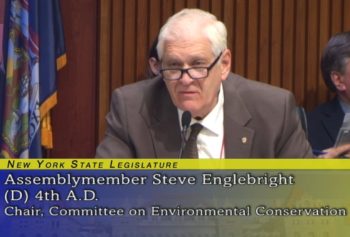
To be adopted, the bill will need to be passed by two consecutive Legislatures, then OK’d by voter referendum. But if lawmakers truly care about the future of the Empire State, they will scrap this bill altogether.
Adopting this amendment would devastate efforts to develop the state’s infrastructure and further deter job creators from setting up shop here.
The proposal amends the state Constitution to create an individual right to “clean air and water and a healthful environment.” That sounds noble.
But what does a “healthful environment” actually entail? And what will creating a private constitutional right do to it in practice?
The answer: It will attract swarms of avaricious attorneys and litigious activist outfits, eager to collect legal fees and shape the future scope of the law.
Bill sponsor Steve Englebright, who chairs the Assembly’s Environmental Conservation Committee, touts the measure’s simplicity. But the consequences will be anything but.
Unlike most legislation, there is no accompanying definition of terms, no enforcement mechanism specified and no description of possible penalties for violating the “right” to a healthful environment.
That’s because the amendment would be a “self-executing right,” which would give every citizen — and interest groups and their lawyers — standing to sue for any perceived environmental transgression.
Municipal authorities such as the MTA, public school districts, medical clinics, and government agencies — any entity required to obtain environmental permits — will incur a substantial increase in the cost of litigation.
Imagine the additional costs and delays for important initiatives such as Gateway, the JFK airport revitalization, and the L-train tunnel restoration.
The vague wording will lure competing environmental crusaders and advocates to the courts, where judges will be left to legislate from the bench and decide what constitutes a “healthful environment,” how the word “clean” is defined and develop what actually counts as a violation under the law.
Will every bad smell or puff of smoke spawn a lawsuit?
In Pennsylvania, which adopted a similar provision in 1971, courts muddled through how private actors can enforce the rights created by the amendment.
A 2017 ruling from the Keystone State’s highest court expanded the law — and the possibility of more lawsuits there, which government lawyers say could thwart economic development.
Broad interpretations entice zealous lawyers and their allies to challenge permitting or legislation on constitutional grounds, as a violation of environmental rights, effectively promoting unfettered vigilante regulation through litigation.
Even after the proper environmental-review processes have been completed and permits acquired, lawsuits based on nebulous allegations that projects are infringing on a right to a healthful environment will become the norm.
Environmental Advocates of New York, which has voiced support for the Green Amendment, recently released a report backing additional investment in drinking and wastewater infrastructure.
But those improvements will surely be held up by costly litigation, should environmental rights be written into the state Constitution.
In fact, a similar proposal to amend the Maryland constitution was withdrawn this year after the state’s Department of Legislative Services found that litigation costs to state and local authorities would skyrocket, and some agencies would need to hire more of their own lawyers to handle the increased workload.
New York’s already pro-lawsuit statutes have bred a robust litigation industry, and this proposed amendment will only solidify the state’s reputation as the lawsuit capital of the world.
An Institute for Legal Reform report found that New York has the country’s highest annual per-household litigation costs — $6,066 in 2016.
In one early court decision following the enactment of the amendment in Pennsylvania, judges expressed concern about the amendment’s due-process implications, writing that “a property owner would not know and would have no way, short of expensive litigation, of finding out what he could do with his property.”
Let’s hope the next Legislature heeds these warnings and ultimately lets this one go.
Read more at NY Post

















Their favorite Green has big $$$$$$$$$$$$$$$$$$$$$$$$$$$$$$$$$$$$$$$$$$$$$$$$$$$ all over them and with Ben Franklin on the front yes lots and lots of G Notes